The Colony of Cats
Long ago, in the days when animals spoke, there lived a community of cats in a deserted house not far from a large town. They had everything they needed for their comfort, they were well fed and well lodged, and an unlucky mouse stupidly ventured in their way, they hunted it for sport. The old people of the town spoke of a time long ago when the whole country was so overrun with rats and mice that all the corn had been eaten up. The people were saved from starvation by cats. It might have been gratitude that the descendants of the cats were allowed to live in peace in their house. No one knows where they got the money to pay for everything, nor who paid it, for all this happened so very long ago.
The cats were rich enough to keep a servant to the things the cats could not – the housework and cooking the meat (for they did not condescend to eat it raw). The cats were very difficult to please about the housework and most women quickly tired of living alone with only cats for companions so they never kept a servant long. It became a saying in the town, when anyone found herself reduced to her last penny: “I will go and live with the cats”.
Lizina was unhappy at home; her widowed mother preferred Lizina’s older sister and often neglected Lizina while spoiling her sister. If Lizina complained, her mother beat her. One day Lizina could stand it no longer and she declared she was going to live with the cats. Her mother was all too pleased to see Lizina go and chased her away with the broom.
Lizina ran all the way to the cats’ house. The cats’ cook had left them that very morning, with her face all scratched from a quarrel with the head of the cats’ house. Lizina was therefore very welcome and she set to work at once to prepare the dinner, worried that she would not be able to satisfy her employers.
She was frequently hindered by a constant succession of cats who appeared one after another in the kitchen to inspect the new servant; one was in front of her feet, another upon a chair, a third sat on the kitchen table and several more prowled about the kitchen. They all purred, pleased with their new maid, but Lizina did not yet understand their language, and often she did not know what they wanted her to do.
However, as she was a kind-hearted girl, she set to work to pick up the little kittens which tumbled about on the floor, she patched up quarrels, and nursed on her lap a big old tabby with a lame paw. This made a favorable impression on the cats, and it was even better after a while, when she had had time to grow accustomed to their strange ways. Never had the house been kept so clean, the meats so well served, nor the sick cats so well cared for.
After a while, the house of cats had a visit from an old cat, whom they called Father Gatto. Father Gatto by himself in a hilltop barn and sometimes came down to inspect the little colony. He was much taken with Lizina, and asked the cats “Are you well served by this nice, black-eyed little person?” to which they replied “Yes Father Gatto, we have never had so good a servant!” Each time he visited, Father Gatto asked the same question and, each time, the cats gave the same answer. However, after a time, the observant old cat noticed that the little maid was looking ever more sad.
“What is the matter, my child? Has any one been unkind to you?” he asked one day, when he found Lizina crying in her kitchen.
Lizina sobbed “No Father Gatto! They are all very good to me, but I long for news from mother and my sister at home.”
Old Gatto, being a sensible old cat, understood her feelings and said, “You shall go home and you need not come back here unless you please. But first you must be rewarded for all your kind services to my children. Follow me down into the inner cellar, where you have never yet been, for I always keep it locked and carry the key away with me.”
Lizina looked round her in astonishment as they went down into the great vaulted cellar underneath the kitchen. Before her stood the big earthenware water jars, one full of oil, the other full of a liquid that shone like gold.
“Which of these jars shall I dip you in?” asked Father Gatto, with a toothy, whiskery grin.
Lizina looked at the two jars and finally replied, “In the oil jar,” for she did not think herself worthy of dipping in gold.
Father Gatto replied, “Oh no, my child, you deserve better than that!” and seizing her in his strong paws he plunged her into the liquid gold.
Lizina came out of the jar shining gold from head to foot, only her pink cheeks and long black hair keeping their natural color. Father Gatto purred loudly with satisfaction.
“Now you may go home to see your mother and sister,” said old Gatto, “but take care that if you hear the cock crow you must turn towards it, but if you hear the ass bray, you must look the other way.”
The little maid gratefully kissed Gatto’s white paw and set off for home. Just as she got near her mother’s house the cock crowed, and quickly she turned towards it. Immediately a beautiful golden star appeared on her forehead, crowning her glossy black hair. At the same time the ass began to bray, but Lizina took care not to look into the donkey field where the donkey was grazing. Her mother and sister, who were in front of their house, cried out in astonishment when they saw Lizina. They cried out in even greater admiration when she took her handkerchief from her pocket and drew out also a handful of gold.
For some days the mother and her two daughters lived very happily together, for Lizina had given them everything she had brought away except her golden clothing, for that would not come off, in spite of all the efforts of her jealous sister. The golden star could not be removed from her forehead, but all her gold pieces had ended up with her mother and sister.
“Maybe I will go and see what I can get out of the pussies,” said Peppina, Lizina’s older sister, taking Lizina’s basket and fastening her pockets into her own skirt, “I should like some of the cats’ gold for myself,” and left the house before the sun rose. The cat colony had not yet taken another servant, knowing they could never get one as good as Lizina, but when they heard that Peppina was her sister, they all ran to meet her.
“She is not at all like Lizina,” whispered the kittens among themselves.
“Hush!” the older cats said, “not all servants can be pretty.”
But silently they all agreed she was not at all like Lizina. On her very first day she shut the kitchen door in the face of the tom-cats who used to enjoy watching Lizina working. A young and mischievous cat who jumped in by the open kitchen window and onto the table got such a blow with the rolling-pin that he yelled for an hour.
Each day, the household became more and more aware of its misfortune. The work was as badly done and the servant was surly and disagreeable. Heaps of dust collected in the corners of the rooms and cobwebs hung from the ceilings and in front of the window-panes. The beds were hardly ever made and the feather beds, loved by the old and feeble cats, were never shaken or plumped up. At Father Gatto’s next visit he found the whole colony in a state of uproar.
“Caesar has one paw so badly swollen that it looks as if it were broken,” said one. “Peppina kicked him with her great heavy boots. Hector has an abscess in his back where a wooden chair was flung at him. Agrippina’s three little kittens have died of hunger beside their mother, because Peppina forgot them in their basket up in the attic. There is no putting up with the creature – do send her away, Father Gatto! Lizina herself would not be angry with us, she must know very well what her sister is like.”
“Come here,” said Father Gatto, in his most severe tones to Peppina. He took her down into the cellar and showed her the same two great jars. “In which of these shall I dip you?”
Peppina answered at once, “In the liquid gold,” for she was not at all modest and was greedy as well as unkind.
Father Gatto’s growled angrily, “You have not deserved it!” and flung her into the jar of oil, where she was nearly suffocated. When she came to the surface screaming and struggling, the vengeful cat seized her again and rolled her in the ash-heap on the floor. When Peppina rose, dirty, blinded and disgusting to behold, he pushed her out of the door, saying, “Begone and when you meet a braying ass be careful to turn your head towards it.”
Stumbling and raging, Peppina set off home. She was within sight of her mother’s house when she heard the donkey braying in its field. Quickly she turned her head towards it and a donkey’s tail sprang from her forehead. She ran the rest of the way home as fast as she could, shrieking in anger and despair.
It took Lizina two hours and two cakes of soap to get rid of the oil and ashes that Father Gatto had covered Peppina in, but the donkey’s tail was impossible to get rid of – it was as firmly fixed on Peppina’s forehead as was the golden star on Lizina’s. Their furious mother blamed Lizina for all her sister’s woes and beat the girl mercilessly with the broom, then she took her to the well and lowered her into it, leaving poor Lizina at the bottom of the well weeping and crying for help.
Before all this happened, however, the king’s son had passed the house and had seen pretty Lizina sitting sewing in the parlour. He had passed the house several times to admire the golden girl with the pretty pink cheeks and the long black hair. Finally, he summoned up the courage to ask her hand in marriage and Lizina had gladly accepted. The next morning, when the prince arrived to claim his bride, he found her wrapped in a large white veil.
“This is how maidens are received from their parents’ hands,” said the mother, who hoped to make the king’s son marry Peppina in place of her sister, and had fastened the donkey’s tail round her head like a lock of hair under the veil.
The prince was young and shy, so he made no objections, and seated Peppina in the carriage beside him. Their way led past the old house inhabited by the cats, who had heard that the prince was to marry a beautiful golden maiden with a star on her forehead and knew it must be their own dear Lizina. They were all at the window and as the carriage slowly passed in front of the old house, the cats began to sing “Mew, mew, mew! Prince, look quick behind you! In the well is fair Lizina, And you’ve got nothing but Peppina!”
When he heard this the coachman, who understood the cat’s language better than the prince, stopped his horses and asked if the prince had understood what the cats were singing. The prince threw back the veil and discovered the puffed-up, swollen face of Peppina, with the donkey’s tail twisted round her head.
“Traitress!” he exclaimed and ordered the carriage to be turned round. He drove the greedy elder daughter, quivering with rage, back to the old woman who had tried to deceive him. With his hand on the hilt of his sword he demanded Lizina in so commanding a voice that the mother hastily pulled Lizina from out of the well. Lizina’s clothing and her star shone so brilliantly that when the prince led her home to his father, the whole palace was lit up.
The next day Lizina and the prince were married and all the cats, from tiny kittens under their mothers’ bellies to Old Father Gatto himself, were present at their wedding.
Found at: Moggy Cat
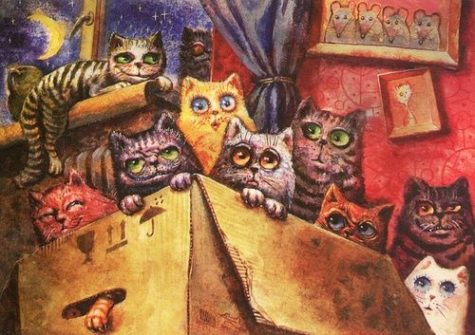

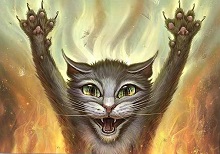

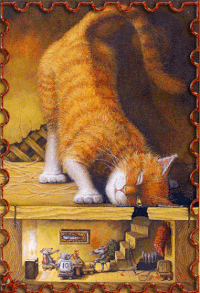
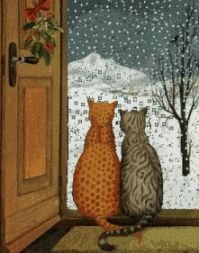

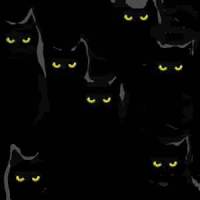
Leave a Reply